Skip To...
Beloved by many, the Reigns series now returns with Three Kingdoms. While the game has already launched on mobile platforms through Netflix, it is now coming to Nintendo Switch and PC. I had the opportunity to play it on the latter, and I can say that it is a combination of a classic game like The Oregon Trail and combat mechanics similar to TCGs. While it is a very simple port that may confuse some with certain systems, it is a lighthearted title that will give you a few hours of entertainment without much effort.
Reigns: Three Kingdoms Review: Knowledge in History Not Required
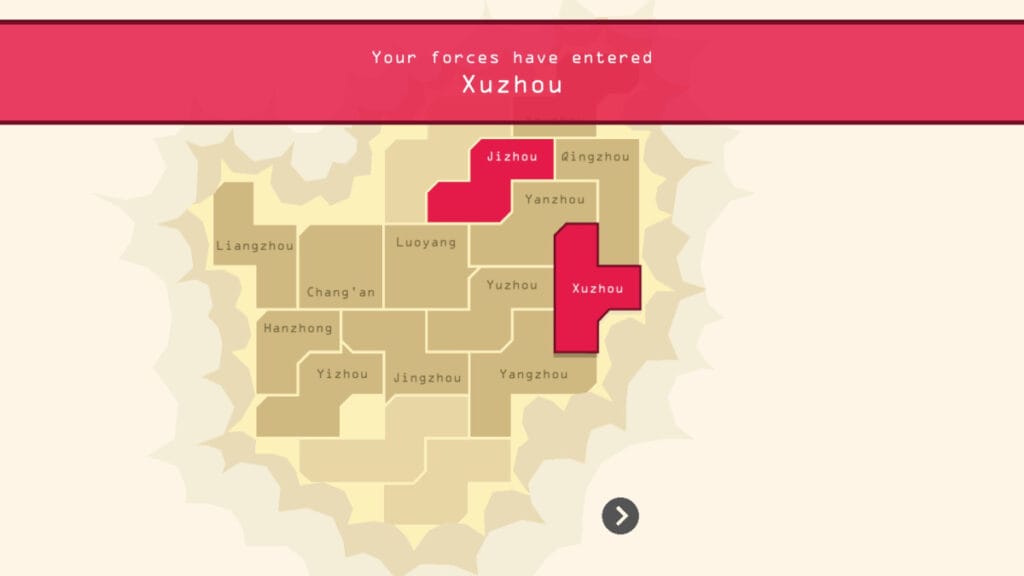
Initially, I was a little afraid to learn that the new Reigns: Three Kingdoms game occurred during one of the most famous periods in Chinese history due to not being so versed in the subject. Fortunately, you don’t have to be an academic to enjoy the game. This installment makes almost every system easy to understand, and when you least expect it, you are being sucked into a world of endless cousins who want to save the country; more on that later. Of course, this comes with significant decisions, a simple but entertaining card game, and memorable art that makes getting beaten to a pulp look less gruesome.
Story: Endless Cousins to Save the Country
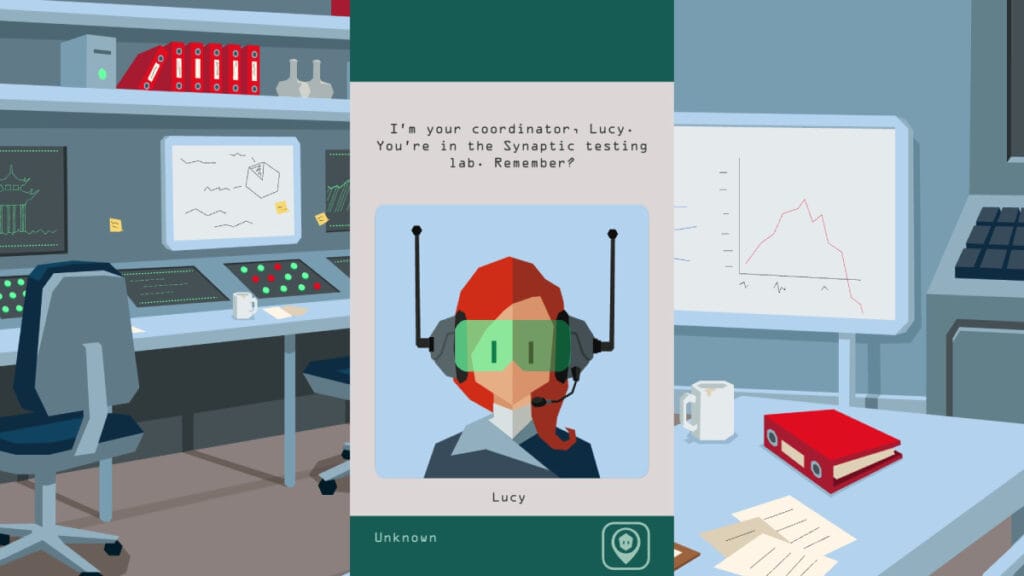
The game starts with your character being a test subject for what I can only describe as an Animus, similar to that of Assassin’s Creed, but without having gone through the Quality Assurance department. Here, you are asked to go to a simulation of the Three Kingdoms period to relive the history of this era. Things get complicated when you die for the first time, and the company realizes that you remember everything you saw in the simulation, something that shouldn’t happen but justifies certain game systems that I’ll talk about later. This is only the story of the present time, but once you “travel” to the past, things get interesting.
In the simulation, you are a leader in the aforementioned era, where everything is at your mercy. In a Choose-Your-Own-Story style, the game forces you to swipe right or left to make decisions and unfold the story. For example, you can decide whether to join the empire or the rebels by swiping. Yes, it’s a phone port, so that’s where the mechanics come from. Although, the important thing is the stories that open up. Do you want to sack villages? Do you want to marry to strengthen your army? No problem. Of course, almost everything has a consequence.
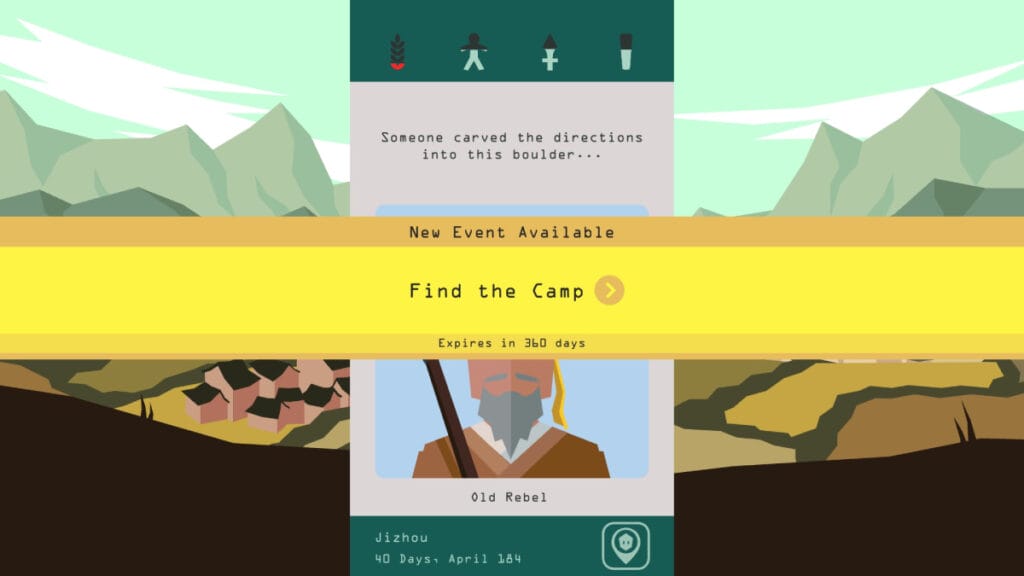
While the game takes elements from actual history, you’re the one who creates the story at the end and decides how to conquer the provinces. In one of my runs, I decided to join the rebels and be benevolent to everyone. I helped merchants, freed the children from their parents’ clutches, and even gave liquor to my tired soldiers. All this, I thought, would make me a great ruler, but sadly, it only made the nobility burn my house down. Fortunately, the game revives you as one of the thousands of cousins your original character had, and the decisions they made pass on to your new character, which leads to more stories and a rogue-lite loop that hooked me.
There are several endings in Reigns: Three Kingdoms, as the game pushes you to find new events and missions to see them unfold. At first glance, it looks like an experience you could play without paying attention, but this is not the case. Some events will only open up if you remember what a certain character said, and behaving in a certain way might block you out of some outcomes. While it isn’t the best plot, it is intriguing in its own way, and it gets better the more you keep digging into any of your lives in this period.
Gameplay: Swipe to Save Your Life
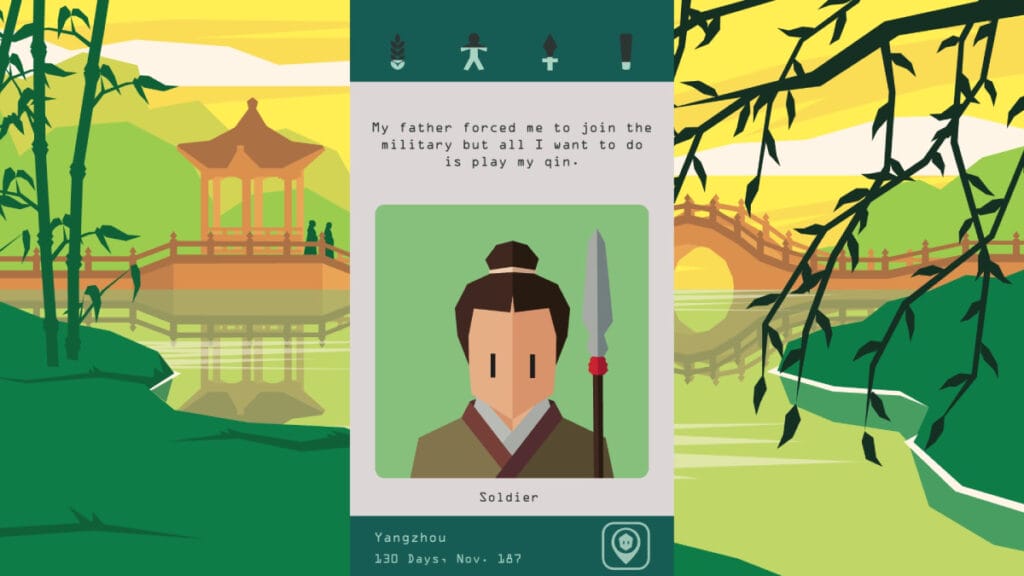
Reigns: Three Kingdoms has several systems that, while simple, work well and make an engaging game. You have elements of Choose Your Own Adventure, stat management, rogue-lite, and a card game. While all of this may seem crowded, it’s not.
Focusing on the first, we have the part where you create the story. You decide where to take your game. If you want to conquer provinces, you can. If you want to be peaceful, you can do that too. Of course, Three Kingdoms doesn’t let you run without direction. Some missions appear after unlocking specific options that give you a clear objective. At one point, I had to take my troops to a new camp. The game asked me to memorize the directions and set the tone for a mini-game. This gives dynamism to a somewhat static experience, and it gripped me because I wanted to know where each mission was taking me.
Second, we have a type of stats or resource management that dictates your game. Initially, I didn’t like how little the game explains about them, but as you progress, you get the hang of them. You have supplies to buy things and bars that dictate your status towards the people, the military, and your moral compass. Going too high or too low on any of them causes you to die. I loved this because I’m used to playing at extremes of one or the other, but here, you must find a middle ground every time.
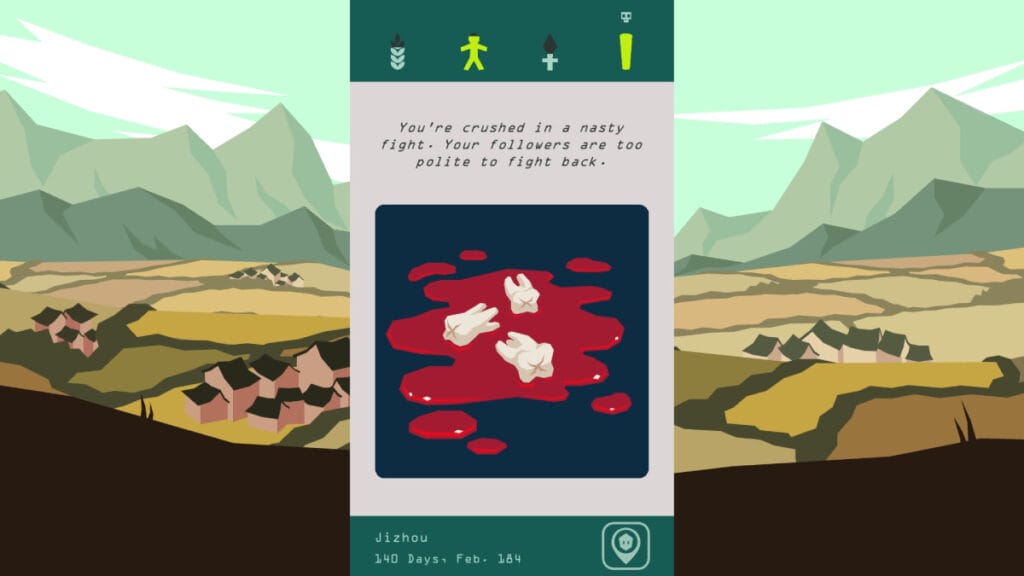
Speaking of dying, this is where rogue-lite systems come in. When you perish, you start the story again, but you keep some things like the combat cards you unlock and the provinces you have explored. Best of all, you also have the decisions your past life made. Did you piss someone off? Be careful because they can cause you trouble. Initially, I played without any worries, but when I realized my dynasty was dropping like flies, I had to be more careful and please everyone to avoid dying and see more paths in the game. And although this is great, it is tedious to reach the last hours of this installment and see that almost all events are repeated.
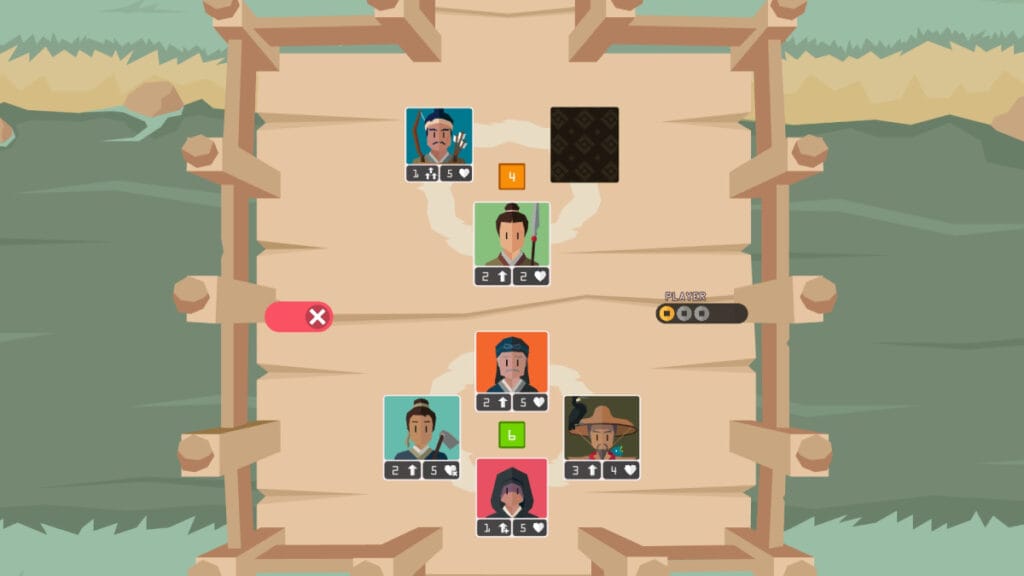
Finally, the card combat system is very basic but extremely addictive. You start the round with a special card that only you have and three others that come out of your deck. Each card has an attack and life stats, and some have abilities. The goal is to wipe out your opponent’s supply points after making their cards disappear, similar to Yu-Gi-Oh! Sadly, I didn’t find much combat in the story because they repeated several of my events. Still, there is excellent multiplayer functionality for those who just want to battle, and believe me, it can be just as addictive as Hearthstone or other games in the genre.
Graphics & Audio: Beauty in Simplicity

Reigns: Three Kingdoms may be a small game, but its style is unique and charming. At first, it reminded me a lot of the style of certain South Park characters, as if they were cutouts. What I liked the most, though, were the backgrounds of each province, which felt different because of the color palettes that changed the place where you were. I didn’t find the audio as memorable because maybe it wasn’t a priority since it was originally a mobile game, but it still has good and relaxing tracks that go with the game’s tone.
Conclusion: A Couple of Hours of Entertainment
Reigns: Three Kingdoms is a game that’ll hook you for a while. Its story could be better or have more involved gameplay, but it is relaxing and merges several systems without being overwhelming. I see myself playing it more on my Nintendo Switch than on PC for the laid-back feel and when I’m in the mood for a quick card battle. While I liked it, there should be better explanations for many UI elements, such as which actions increase or decrease certain stats and more variety in the last hours to avoid seeing the same event again. Still, seeing the chaos unfold in this era due to your decisions is a treat, and I see myself returning for more.
Reigns: Three Kingdoms is available on Mobile, PC (Reviewed), and Nintendo Switch.
Review copy given by Publisher.
Reigns: Three Kingdoms
A relaxing choose-your-own-story game with an iconic art style.
Pros
- Easy-to-learn combat systems.
- A relaxing pick-up-and-play game.
- A lot of replayability.
Cons
- Many events tend to repeat.
- Lack of explanation for many UI elements.







